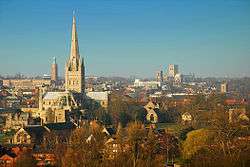List of places in England with counterintuitive pronunciations: M–Z
This is a sublist of List of names in English with counterintuitive pronunciations.
Pronunciations for the following common suffixes are regular pronunciations, despite being counterintuitive at first glance:
- -b(o)rough and -burgh – /bʌrə/, /brə/
- -bury – /bʌri/, /bri/
- -cester – /stər/[1]
- -combe – generally /kəm/, although /kuːm/ in some cases (e.g. Templecombe, Woolacombe) and in the standalone word 'combe' or 'coombe' (including in place names such as Castle Combe and Coombe Bissett).
- -gh – silent
- -ham – /əm/
- -holm(e) – /hoʊm/, /əm/
- -shire – /ʃɪər, ʃər/
- -quay - /kiː/
- -wich - /ɪtʃ/, /ɪdʒ/[2]
- -wick – /ɪk/[3][n 1]
- -mouth – /məθ/ in some cases (e.g. Bournemouth, Dartmouth, Weymouth), /maʊθ/ in others (e.g. Avonmouth, Lossiemouth, Tynemouth).
Pronunciation of the following common prefix is variable depending on dialect:
- Al- /ˈɒl/; /ˈɔːl/
Place names in England
M
- Magdalen Hill, Winchester, Hampshire – /mɔːn/
- Manea, Cambridgeshire - /ˈmeɪni/
- Marholm, Peterborough, Cambridgeshire – /ˈmærəm/
- Marlborough, Wiltshire – /ˈmɔːlbrə/[4]
- Marske, Redcar and Cleveland - /ˈmæsk/
- Marylebone, London – /ˈmɑːrlɪbən/, or /ˈmærɪlᵻbən/[4][n 2]
- Masham, North Yorkshire – /ˈmæsəm/
- Meols:
- Meols, the Wirral, Merseyside – /mɛlz/[4]
- Meols Cop, Southport – /miːlz/[4]
- Meopham, Kent – /ˈmɛpəm/[4]
- Mildenhall, Wiltshire – /ˈmʌldənhɔːl/ besides intuitive[5]
- Mousehole, Cornwall – /ˈmaʊzəl/[4]
- Mow Cop, Staffordshire – /ˈmaʊkɒp/
- Mytholmroyd, West Yorkshire – /ˌmaɪðəmˈrɔɪd/[4]
N
- River Nene, Northamptonshire – /nɛn/ (intuitive /niːn/ also heard) [4]
- Norwich, Norfolk – /ˈnɒrᵻdʒ/ [4][n 3]
O
- Olney, Buckinghamshire – /ˈɔːni/ (local pronunciation);[6] /ˈoʊlni/[4]
- Osbournby, Lincolnshire – /ˈɒzənbi/
- Oswaldtwistle, Lancashire – /ˈɒzəltwɪzəl/[7] (local pronunciation);[4]
- Ovingham, Northumberland – /ˈɒvɪndʒəm/
P
- Pall Mall, London – /ˈpælˈmæl/
- Plaistow:
- Plaistow, Greater London – /ˈplɑːstoʊ/[8]
- Plaistow, West Sussex – as above[8]
- Plymouth, Devon – /ˈplɪməθ/ as in early colony of today's USA of Plymouth, Massachusetts
- Ponteland, Northumberland – /pɒntˈiːlnd/
- Portesham, Dorset – /ˈpɒsəm/ (old-fashioned), currently /ˈpɔərtᵻʃəm/ or /ˈpɔərtsəm/
- Postwick, Norfolk – /ˈpɔːzᵻk/
- Poxwell, Dorset – /ˈpoʊkswɛl/ (as in Pokesdown in the same county)
- Prideaux Castle, Cornwall – /ˈprɪdəks/
- Prinknash, Gloucestershire – /ˈprɪnᵻʃ/
- Prudhoe, Northumberland - /ˈprʌdə/
- Puncknowle, Dorset – /ˈpʌnəl/
Q
- Quadring, Lincolnshire - /ˈkweɪdrɪŋ/
- Quernmore, Lancashire - /ˈkwɔərmər/
R
- Rainworth, Nottinghamshire – /ˈrɛnəθ/
- Rampisham, Dorset - /ˈrænsəm/[9]
- Ratlinghope, Shropshire – /ˈrætʃʌp/[n 4]
- Reading, Berkshire – /ˈrɛdɪŋ/[n 5]
- Rievaulx, North Yorkshire – /riːvoʊ/ (unusual equivalent to the French pronunciation)
- Ruislip, Greater London – /ˈraɪslᵻp/
S
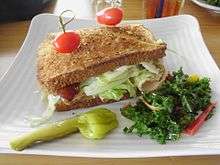
Sandwich has been immortalized as a near-universal food item but in the same way as a series of small towns in Cheshire breaks the usually ignored (elided) w of -wich.
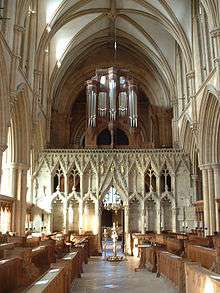
Southwell Minster is a cathedral in England, unusually in a village. Its diocese serves Nottinghamshire. County towns Salisbury (as in Salisbury Cathedral and Lord Salisbury, multiple-term Prime Minister) and Shrewsbury, with its public school and retained early medieval Abbey church (through the English Reformation under the Tudor period) fall in this list always and as to one variant respectively.
- St Ives, Cornwall – /sənt ˈiːv/[n 6]
- St Teath, Cornwall – /tɛθ/
- Salisbury, Wiltshire – /ˈsɒlzbri/, ˈ[n 7]
- Salle, Norfolk – /ˈsɔːl/
- Sandwich, Kent - /sændwɪtʃ/, /sændwɪdʒ/ (as in food item named after its Earl)
- Seighford, Staffordshire – /ˈsaɪfəd/
- Shrewsbury, Shropshire – /ˈʃroʊzbri/ or /ˈʃruːzbri/[7]
- Shaftesbury, Dorset (and the associated earldom) – /ˈʃɑːftsbri/,or /ˈʃæfsbri/
- Slaithwaite, West Yorkshire – pronunciation varies /ˈslæwɪt/, /ˈslæθwɪt/[n 8]
- Slaugham, West Sussex - /ˈslæfəm/
- Snowshill, Gloucestershire – /ˈsnoʊzəl/[10] or /ˈsnɒzəl/[11]
- South Elmsall, West Yorkshire – /saʊθ ˈɛmsəl/
- Southwark, Greater London – /ˈsʌðərk/[n 9]
- Southwell, Nottinghamshire – /ˈsʌðəl/[7] or intuitively.[n 10]
- Sowerby and Sowerby Bridge, West Yorkshire - /ˈsɔːbi/ (though Sowerby, North Yorkshire intuitively /ˈsaʊəbi/)
- Sproxton, Leicestershire – /ˈsproʊsən/
- Staithes, North Yorkshire – locally /stɪərz/
- Stawell, Somerset – /stɒl/
- Steyning, West Sussex – /ˈstɛniŋ/;[7]
- Stiffkey, Norfolk – /ˈstjuːkiː/ or intuitively /ˈstɪfkiː/
- Stivichall or Styvechale, Coventry – /ˈstaɪtʃəl/
- Stockingford, Warwickshire – /stɒkɪŋˈfɔːd/ or /stɒkɪŋɡˈfɔːd/ (final emphasis)
- Streatham, London – /ˈstrɛtəm/
- Stroxton, Lincolnshire – /ˈstrɔːsən/
T
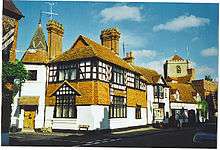
The name of the diminished market town of Dorchester on Thames indicates its founding in Roman Britain. It occupies the land projecting at the confluence of the rivers Thames and Thame which are elisions of the Roman name for the main river and as with the town of Thame take their t sound from the Tamesis. All have phonetically shifted away from a short 'a' each to a different longer different vowel in the case of the main river:  i/tɛmz/.
i/tɛmz/.
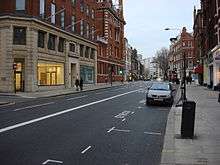
Theobald's Road in London.
- Tacolneston, Norfolk – /ˈtækəlstən/
- Teignmouth, Devon – /ˈtɪnməθ/[7]
- Teston, Kent – /ˈtiːsən/
- Thame, Oxfordshire, and River Thame – /ˈteɪm/
- River Thames and all names derived from it – /ˈtɛmz/[n 11]
- Theobald's Road, London – now usually intuitive /ˈθiəbəldz/ but traditionally /ˈtɪbəldz/[12]
- Threekingham, Lincolnshire – /ˈθrɛkɪŋɡəm/
- Tideswell, Derbyshire – /ˈtɪdsəl/[7][n 12]
- Tintwistle, Derbyshire – /ˈtɪnsəl/[7]
- Todmorden, West Yorkshire – /ˈtɒdmədən/ [n 13].[13]
- Torpenhow, Cumbria – /trəˈpɛnə/ locally or an intuitive /ˈtɔərpənhaʊ/
- Towcester, Northants – /ˈtoʊstə/
- Trewoon, Cornwall – /ˈtruːən/
- Trottiscliffe, Kent – /ˈtrɒzli/
U
- Ulgham, Northumberland – /ˈʌfəm/
- Uttoxeter, Staffordshire – /juːˈtɒksᵻtər/ (only British town commencing with /juː/ sound)
V
W

Worcester is a cathedral city of more than 100,000 people and the county town of Worcestershire which has more than 550,000 inhabitants.
- Warwick (and -shire) – /ˈwɒrᵻk/[n 14]
- Wavertree, Lancashire – /ˈwɔːtri/ mostly obsolete[14]
- Little Weighton and Market Weighton, East Riding of Yorkshire – /ˈwiːtən/
- Welwyn (and its Garden City), Hertfordshire – /ˈwɛlᵻn/
- Wesham, Lancashire - /ˈwɛsəm/
- Whittingham, Northumberland – /ˈwɪtɪndʒəm/
- Widecombe, Devon – /ˈwɪdᵻkəm/
- Wisbech, Cambridgeshire – /ˈwɪzbiːtʃ/[7]
- Witham, Essex – /ˈwɪtəm/
- Wombwell, South Yorkshire - /ˈwʊmwɛl/
- East Woodhay and West Woodhay – /ˈwʊdi/
- Woolfardisworthy, Devon – /ˈwʊlzi/ or /ˈwʊlzəri/
- Worcester (and -shire) – /ˈwʊstər/
- Worstead, Norfolk - /ˈwʊstᵻd/
- Wressle, East Riding of Yorkshire – /ˈrɛzəl/
- Wrotham, Kent – /ˈruːtəm/
- Wroughton, Wiltshire – /ˈrɔːtən/
- Wybunbury, Cheshire – /ˈwɪnbri/
- Wycombe, (High) and (West), Buckinghamshire – /ˈwɪkəm/
- Wymondham, Norfolk – /ˈwɪndəm/[n 15]
Y
- Yeavering, Northumberland – /ˈjɛvəriŋ/
- Yeaton, Shropshire – /ˈjɛtən/
Z
- Zouch, Nottinghamshire – /ˈzɒtʃ/
- Ashby-de-la-Zouch, Leicestershire – /ˌdələˈzuːʃ/ (unusual equivalent to the French pronunciation)
See also
- List of places in England with counterintuitive pronunciations: A–L
- Grapheme
- English spelling
- Pronunciation of Chinese names in English - counterintuitive Q, X, C, Zh, etc. in words romanised in Pinyin.
Notes and references
- Notes
- ↑ Accordingly: Southwick, Hampshire - /ˈsʌðᵻk/
Anomalies: Southwick, West Sussex is pronounced /ˈsaʊθwᵻk/, like Painswick, Gloucestershire, Prestwick and Hardwick as well as Pickwick a former village in Wiltshire through which the novel The Pickwick Papers got its title, but these by population represent a very small minority. - ↑ Wells also lists /ˈmærɪbən/ but that is obsolete.
- ↑ Like Berwick, the fact of the "r" being pronounced with the last syllable negates an intuitive interpretation. Many people outside of its area/history would have a very low chance of guessing this.
- ↑ Sometimes intuitive also.
- ↑ Can be taken as a group with Beaminster, Leamington and Yeavering
- ↑ c.f. St Ives in Cornwall as well as Cambridgeshire and Dorset /sənt ˈaɪvz/
- ↑ Or /ˈzɔːzbri/ occasional, traditional, informal pronunciation
- ↑ Many more variants are researchable, rarer, down to /sluːwit/ and /slaʊwit/
- ↑ locally and in some dialects ˈsʌvək
- ↑ Racecourse commentators always use the shorter form rather than the longer.
- ↑ cf. Thames River (Connecticut) pronounced /ˈθeɪmz/
- ↑ The family name Tideswell locally and in its senior branch pronounced /ˈtɪdzə/, e.g. 4crests.com Coat of Arms and A dictionary of English surnames Percy Hide Reaney & Richard Middlewood Wilson
- ↑ The source notes only the BBC uses /ˈtɒdmɔərdən/
- ↑ likewise in road names and Warwickshire
- ↑ Regional pronunciation.
- References
- ↑ e.g. City of Leicester which follows e.g. Towcester, Rocester and Alcester – /ˈɒlstər/ or /ˈɔːlstər/
- ↑ Well-known, large examples are Woolwich and West Bromwich cf. Nantwich and Droitwich Spa
- ↑ e.g. Smethwick, Chiswick and Flitwick
- 1 2 3 4 5 6 7 8 9 10 11 Wells, John C. (2000). Longman Pronunciation Dictionary. 2nd ed. Longman. ISBN 0-582-36468-X.
- ↑ Mildenhall audio pronunciation
- ↑ Olney Town Council Official Guide
- 1 2 3 4 5 6 7 8 Pronouncing British Placenames at BBC's Edited Guide Entry h2g2 site
- 1 2 Sangster, Catherine; Olausson, Lena (2006). Oxford BBC guide to pronunciation. Oxford, England: Oxford University Press. p. 300. ISBN 0-19-280710-2.
This is correct for the Plaistows in London and West Sussex.
- ↑ Roland Gant (1980). Dorset Villages. Robert Hale Ltd. p. 102. ISBN 0 7091 8135 3.
- ↑ St. Clair Baddeley, W. (1913). Gloucestershire Place-Names. Gloucester: John Bellows. pp. 142–143. Retrieved 15 January 2015.
- ↑ "the cotswolds: snowshill manor". suziebeezieland. Retrieved 15 January 2015.
- ↑ "Hidden London - Pronunciation". Hidden London. Retrieved 3 January 2015.
- ↑ "See entry for 25th April". Phon.ucl.ac.uk. Retrieved 2012-10-09.
- ↑ William Farrer & J. Brownbill (editors) (1907). "Townships: Wavertree". A History of the County of Lancaster: Volume 3. Institute of Historical Research. Retrieved 16 July 2011.
Further reading
- G. M. Miller (editor) (1971). BBC pronouncing dictionary of British names. Oxford University Press. ISBN 0-19-431125-2.
- Ordnance Survey of Ireland (1989). Gazetteer of Ireland. Government Publications Office. ISBN 0-7076-0076-6.
External links
- h2g2 guide to Pronouncing British Placenames
- How Do You Pronounce That Name? on genealogymagazine.com
- A Pronunciation Guide to Names of Public Figures
- Debrett's Pronunciation of English surnames.
This article is issued from Wikipedia - version of the 12/4/2016. The text is available under the Creative Commons Attribution/Share Alike but additional terms may apply for the media files.
